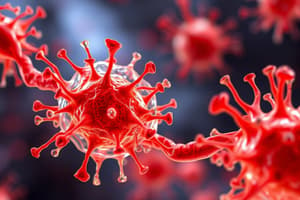Podcast
Questions and Answers
What is the specific residue that caspases prefer to cleave proteins after?
What is the specific residue that caspases prefer to cleave proteins after?
- Serine
- Alanine
- Glutamate
- Aspartate (correct)
What type of domains do initiator procaspases possess that mediate homophilic interactions?
What type of domains do initiator procaspases possess that mediate homophilic interactions?
- Protein interaction domain and CARD
- Prodomain and DED
- Death-effector domain (DED) and caspase-recruitment domain (CARD) (correct)
- Homophilic interaction domain
What is the role of the short prodomain in executioner procaspases?
What is the role of the short prodomain in executioner procaspases?
- It promotes the formation of a heterodimer
- It has no effect on the executioner procaspase
- It inhibits the executioner procaspase (correct)
- It activates the executioner procaspase
What is the product of the cleavage of procaspase-3 by initiator caspases?
What is the product of the cleavage of procaspase-3 by initiator caspases?
What is the consequence of MOMP?
What is the consequence of MOMP?
What is the primary function of the antiapoptotic members of the BCL-2 family?
What is the primary function of the antiapoptotic members of the BCL-2 family?
Which BCL-2 homology domain is necessary for the killing action of proapoptotic members?
Which BCL-2 homology domain is necessary for the killing action of proapoptotic members?
What is the role of the C-terminal hydrophobic domain (TM) in BCL-2 family members?
What is the role of the C-terminal hydrophobic domain (TM) in BCL-2 family members?
What occurs during autophagy in terms of LC3 processing?
What occurs during autophagy in terms of LC3 processing?
What is the outcome of autophagosomes fusing with lysosomes?
What is the outcome of autophagosomes fusing with lysosomes?
Flashcards are hidden until you start studying
Study Notes
Caspases – Initiators and Executioners of Apoptosis
- Caspases are highly selective cysteine proteases that preferentially cleave proteins after aspartate residues (Asp).
- Initiator procaspases (e.g., procaspase-8 and procaspase-9) have long prodomains containing protein interaction domains (e.g., DED and CARD), which mediate homophilic interactions with adaptor proteins (e.g., APAF-1 and FADD).
- Executioner procaspases (e.g., procaspase-3) have short prodomains that inhibit caspase activation.
- Procaspase-3 is activated by initiator caspases, involving cleavage at specific Asp residues, yielding a short inhibitory prodomain, a large subunit (p20), and a small subunit (p10).
- The activated p20 and p10 subunits form a heterodimer, which associates with another heterodimer to form a proteolytic tetramer.
Mitochondrial Outer Membrane Permeabilization (MOMP) and the BCL-2 Family
- MOMP is a key activator of caspases and cell death, allowing the release of pro-apoptotic proteins (e.g., cytochrome c) from the mitochondrial intermembrane space.
- The BCL-2 family of proteins regulates MOMP, comprising antiapoptotic (cell survival), proapoptotic (apoptosis), and "BH3-only" (proapoptotic) members.
- BCL-2 family members possess at least one of four conserved motifs (BH1-BH4) and a C-terminal hydrophobic domain (TM) for membrane association.
- During apoptosis, proapoptotic BCL-2 family members undergo a conformational change, exposing the BH3 domain, necessary for their killing action.
Regulation of Mitochondrial Outer Membrane Permeabilization (MOMP)
- The BCL-2 family regulates MOMP, counteracting proapoptotic proteins (e.g., BAX and BAK) that promote apoptosis.
- p53, a tumor suppressor, also regulates apoptosis in response to DNA damage.
Autophagy
- Autophagy is a complex process involving the formation of autophagosomes, which engulf cytoplasmic components, including proteins and organelles.
- Microtubule-associated protein 1A/1B-light chain 3 (LC3) is conjugated to phosphatidylethanolamine, forming LC3-II, which is recruited to autophagosomal membranes.
- Autophagosomes fuse with lysosomes to form autolysosomes, where captured components are degraded by lysosomal proteases.
Studying That Suits You
Use AI to generate personalized quizzes and flashcards to suit your learning preferences.




